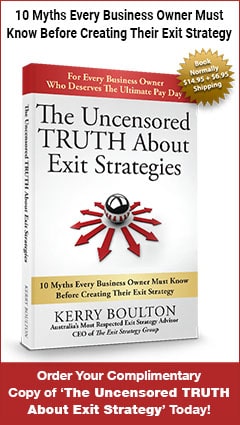The Truth About Business Succession And Exit Planning
The first time was after I sold my international freight forwarding business. I really had no idea what I was going to do, but I wasn’t ready to retire, so I went into business coaching. That was something I had in my skill set and it was the mid-1990s, before coaching became as popular as it is now. I put together a group of coaches and did that for nine years.
I retired again in 2003. I wanted to spend some time with my family, but I’ve always been a worker in the sense that I love business. I didn’t really need to continue working because we had another business which was doing well, so the idea was to let the other business make some money for us.
The last thing you really want to do is to find yourself with a health issue, but that’s what happened with my husband. He developed bowel cancer and, it may not make sense to people reading this, but we decided to sell our business that was doing well in 2007. It was a real estate business, and my husband had stayed on for a couple of years working as a paid list and sell salesman, even though we had already extracted our equity from the business. But then he got cancer and was unable to work.
After we dealt with the cancer, I decided I would love to go back into business coaching again. When I started looking at the market, I realized there was a huge wave of baby boomers coming through – I’m one of them – and no one was thinking about what they were doing with their business.
I came across a press release from Price Waterhouse Coopers in 2014, which highlighted the fact that nearly 60 percent of private businesses in Australia were owned by baby boomers and no-one was addressing what was going to happen. It’s the old 80/20 rule where 80% of businesses that come onto the market don’t actually sell, it’s only the 20% who prepare and position themselves for sale that do sell.
And then there were surveys by associations and other entities asking “Who is thinking about an exit strategy” and the numbers were surprising – it was something no-one had thought about. It might have been a little bit in their awareness, but they weren’t considering what would happen in the future.
The first wave of baby boomers started turning 65 in 2011, and the peak, in terms of the entire population, will be 2028. So maybe you have a business you’ve been running for 20 years and suddenly you decide, “I really have had enough.”
You might run out of puff or you might think, “I’m going to stay in this business for the rest of my life and I’ll put a manager in.”
Whatever your reasons, you need to think about exiting strategically and start doing everything that’s necessary to make your business transferable one way or another.
And that’s really business succession and exit planning. They fall under the umbrella of transferring your business to someone else.
So, with business succession, you might be thinking of finding someone who can manage the business for you, even if you’re not ready to sell. They’ll be part of the business and can give you an opportunity do the things you really love.
This means putting systems into place, putting processes into place, and having your business ready so the business can succeed and run without you. That’s ideal.
Exit planning is thinking about what else you’re going to do if you’re not staying in the business. If you happen to be slightly older and you are looking at a retirement, then it’s considering how you’re going to fill your days. And there are a lot of other issues around that as well, such as estate planning — basic things people don’t really like to think about because it’s facing your own mortality.
You really do need to cover off on those things. I have had quite a few clients who have been 10 years down the track in a very successful business with business partners who did not have a structured buy/sell agreement set up.
I always tell clients to have a look at that sooner rather than later, because it’s much easier to set something like that up in the early days than it is further on. People’s perceptions of value change over time, so it’s important to agree on how you’re going to approach a buy/sell, should that happen in the future, and especially if you have partners or family.
For instance, how would you cope if a partner in the business wanted out or became too ill to stay in? How would you buy that partner out? Do you need an insurance policy in place? What happens if that person is uninsurable?
There are lots of tricky elements to address, and it requires a systematic approach with a whole range of questions to answer and tick off. And that’s what business succession and exit planning is all about.



Recent Comments